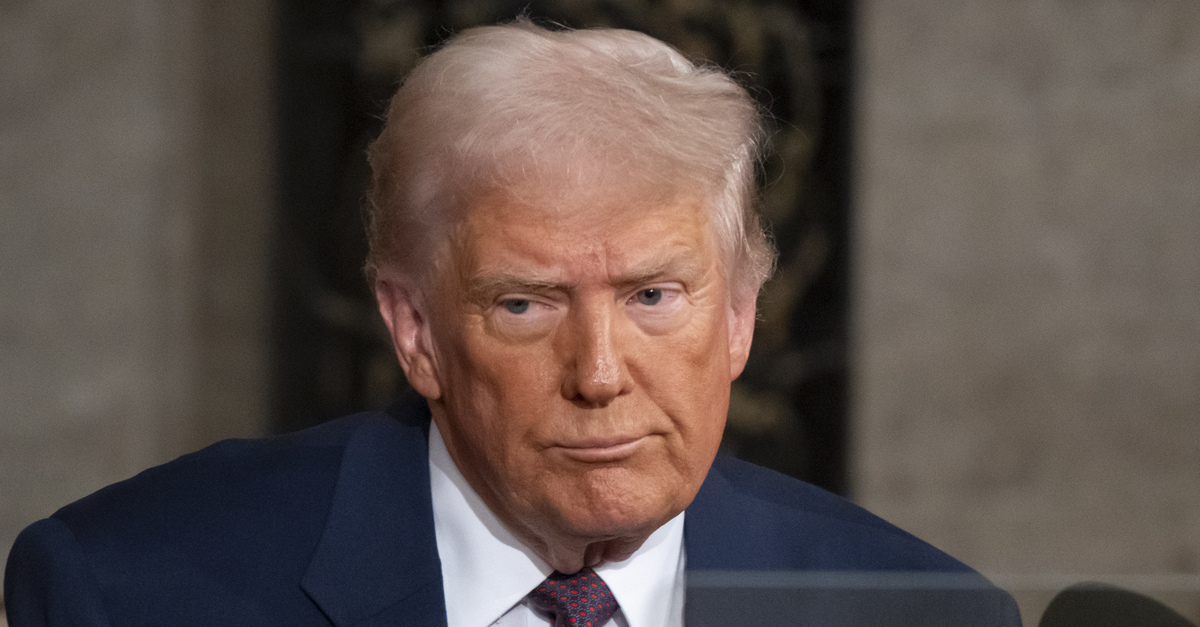Share this @internewscast.com

President Donald Trump addresses a joint session of Congress on Capitol Hill in Washington, Tuesday, March 4, 2025 (AP Photo/Alex Brandon).
A federal judge has rejected an attempt by the Trump administration to halt her directive, issued Friday, to bring back Kilmar Abrego Garcia, a protected Maryland resident, to the United States. He was mistakenly sent to a well-known work prison in El Salvador under the President’s deportation policies affecting Venezuelan migrants, using an authority dating back to the 18th century for wartime situations.
On Sunday, U.S. District Judge Paula Xinis released a 22-page ruling stating she would not withdraw her order compelling the Department of Homeland Security and its Secretary, Kristi Noem, to bring Garcia, deported on March 15, back to U.S. grounds. The Justice Department responded on Saturday by filing an urgent motion to the 4th Circuit Court of Appeals, as well as the lower court, requesting to pause Xinis’ preliminary injunction due to the “urgent harms to the government,” as described in their filings. They labeled Xinis’ directive as “untenable” and unfeasible given Garcia’s current detention location.
“Primarily, it directs Defendants to perform an act beyond their authority: Compel El Salvador to release Abrego Garcia and send him to the U.S.,” DOJ attorneys argued in their appeal. “Kilmar Armando Abrego Garcia is currently detained in El Salvador by its government. The United States has no jurisdiction over Abrego Garcia or the sovereign nation of El Salvador. … No federal court possesses the authority to dictate foreign relations actions to the Executive; this is a sole privilege of Article II, free from Article III oversight. However, this order obligates exactly that — requiring Defendants, under time constraints, to attempt to coerce a foreign country into a specific action.”
Xinis, a Barack Obama appointee, dismissed the DOJ’s claim about the Trump administration having its hands tied with Abrego Garcia. She said the U.S. can’t prop up the prison in El Salvador as “one of the tools” in the government’s deportation shed — as Noem has previously claimed, according to Xinis — and then try to act like nothing can be done.
“Surely, Defendants do not mean to suggest that they have wholesale erased the substantive and procedural protections of the INA (Immigration and Nationality Act) in one fell swoop by dropping those individuals in [the prion] without recourse,” Xinis wrote. “Instead, the record reflects that Defendants have ‘outsource[d] part of the [United States’] prison system. Thus, just as in any other contract facility, Defendants can and do maintain the power to secure and transport their detainees, Abrego Garcia included.”
Xinis on Friday granted a preliminary injunction and gave the DOJ just over three days to facilitate bringing Abrego Garcia back to the country, referring to his deportation as “an illegal act.” The 29-year-old was sent to El Salvador in error as part of President Trump’s proclamation invoking the Alien Enemies Act of 1798 to rush through mass deportations without providing due process to those being flown out of the country, often not to their country of origin. Abrego Garcia was in the country with protected legal status at the time of his deportation. His wife and 5-year-old child are U.S. citizens. The DOJ confessed to the lower court on Friday that his deportation was an “administrative error.”
More from Law&Crime: ‘Pretty sketchy looking’: Judge takes DOJ lawyer to the woodshed over Trump’s mass deportations and whether federal court orders are being ignored
Xinis noted Sunday how the U.S. government and administration officials have repeatedly claimed “without any evidence” that Abrego Garcia is a member of the gang MS-13. Even if that were true, Xinis pointed out how Abrego Garcia is being housed in El Salvador with inmates belonging to MS-13’s “chief rival gang” — Barrio 18. She said it was the threat of retaliation and attacks from Barrio 18 members that got Abrego Garcia out of El Salvador in the first place.
“Abrego Garcia will suffer irreparably were he not accorded his requested relief,” Xinis said. “The risk of harm shocks the conscience. Defendants have forcibly put him in a facility that intentionally mixes rival gang members without any regard for protecting the detainees from harm at the hands of the gangs.”
The judge asserted that Trump admin officials and El Salvador’s government have refused to tell “anyone” why Abrego Garcia was “returned to the very country to which he cannot return” and being held at such a dangerous prison. Attempts by Law&Crime to reach the DOJ for comment Sunday were unsuccessful.
“That silence is telling,” Xinis said. “As Defendants acknowledge, they had no legal authority to arrest him, no justification to detain him, and no grounds to send him to El Salvador — let alone deliver him into one of the most dangerous prisons in the Western Hemisphere. Having confessed grievous error, the Defendants now argue that this Court lacks the power to hear this case, and they lack the power to order Abrego Garcia’s return.”
More from Law&Crime: ‘Shoot Trump tomorrow’: Florida man arrested after Facebook post allegedly threatens president’s life
The Trump administration’s “error” in the Abrego Garcia case follows the government’s apparent violation of a direct order from a different federal judge, who instructed the DOJ to ensure that any migrants on the planes that left for El Salvador on March 15 — one of which was carrying Garcia — returned to the country immediately. The order came from U.S. District Judge James Boasberg during a hearing that took place shortly after the deportation planes took off.
The government has insisted that because Boasberg’s directive was oral and not memorialized in his subsequent written order, it did not have to be followed. Xinis appeared to make a very clear reference to that controversy during Friday’s hearing.
Xinis said that the DOJ has failed to prove why her order fails in the eyes of the law, so she had no other choice than to grant “the narrowest, daresay only, relief warranted: to order that Defendants return Abrego Garcia to the United States.” It was unclear Sunday what Abrego Garcia’s custody status was in El Salvador.
“In the end, Defendants’ redressability argument rings hollow,” Xinis concluded. “As their counsel suggested at the hearing, this is not about Defendants’ inability to return Abrego Garcia, but their lack of desire.”
Love true crime? Sign up for our newsletter, The Law&Crime Docket, to get the latest real-life crime stories delivered right to your inbox.
















